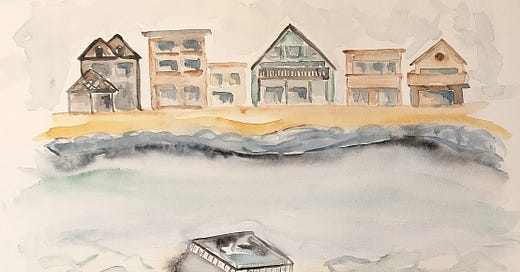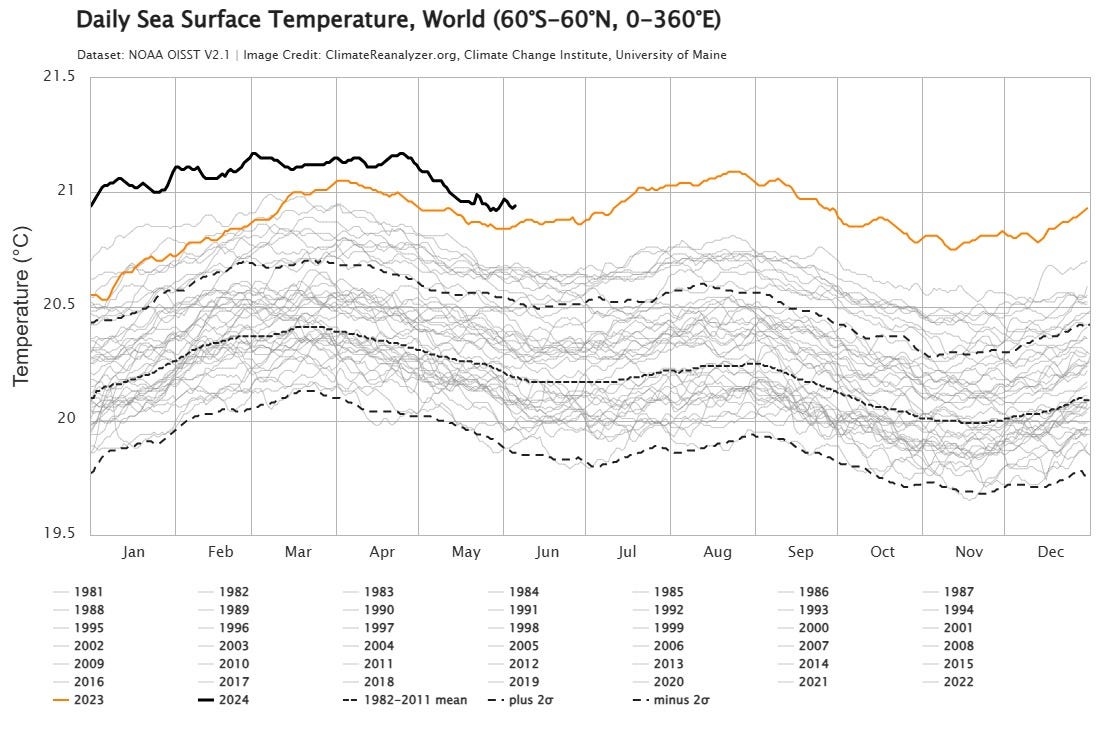Welcome to Mind Flexing, your weekly thought expedition to everywhere and anywhere. Strap on your boots (or put your feet up), take a deep breath, and let’s get flexing.
I don’t understand why people continue to buy multi-million-dollar houses precariously perched by the ocean’s edge. Granted, the views are spectacular—and it’s assured they’ll see that storm surge coming well before anyone else, gaining a first-row seat to the landslide that takes their house—and swimming pool—slip sliding into the sea. Wamberal and Collaroy in NSW are already grappling with such scenarios, and climate data warns they’ll become more common.
You would think buyers should be cautious. Sea temperatures continue to push record levels, icebergs the size of Las Vegas are breaking away from the Antarctic ice shelf, glaciers are melting into the sea at a quickening rate, and sea levels are rising. Global sea levels have risen by about 25cm since 1880 and the pace of that rise has accelerated to about 3-4cm a year in recent decades, according to the Bureau of Meteorology. Based on climatic events this year alone, one can only assume that pace will accelerate further.
But humans are creatures of habit and predictably unfazed. House prices in these most at-risk areas have continued to increase, a report by real estate marketing company Domain showed this week; indeed, houses built close to the coast were worth 20.4% more than those that weren’t.
Domain chief of research and economics Dr Nicola Powell, author of the Domain Flood Report, summed up our behaviour quite succinctly:
“Australians are primarily driven by lifestyle choices and that really comes out when you look at the risk of coastal erosion. People aren’t looking at the risks; they’re prioritising the view. And when anything bad happens, like the subsidence at Sydney’s Collaroy Beach a few years ago, people have very short memories.”
In 2020, a storm swept away 25m of sand from Sydney’s Collaroy and Narrabeen Beaches, with waves crashing against seaside houses. The event followed a similar surge at Collaroy in 2016 in which a swimming pool was dramatically pulled into the ocean.
The Domain flood Report found that about 17,500 properties around Australia—worth over $26.5 billion—faced coastal erosion risks. These warnings are no secret; they’re found on most Council websites around the country. And while Aussie’s sit back on their decks enjoying the view, insurance companies certainly aren’t blindsided—they generally won’t cover what they call ‘actions of the sea’.
For anyone with an eye half open, the warning signs of increased coastal erosion are everywhere.
In 2021, the United Nation’s Intergovernmental Panel on Climate Change (IPCC) predicted that by 2100, oceans will rise by as much as one metre under a worst-case scenario in which the world fails to address high carbon emissions. It may be as low as 28cm if we clean up our act.
The cleaning-up-our-act version—the least devastating scenario—will still have significant consequences.
Dr Michael Kinsela, a coastal marine geoscientist and lecturer in the School of Environmental and Life Sciences at the University of Newcastle, said in a NSW Government case study of his monitoring program CoastSnap:
“Just 20 or 30 centimetres of extra water can translate into tens of metres more erosion, which means a storm of similar strength 30 years ago will have a far greater impact as sea levels rise.”
It’s easy to see how a worst-case scenario would devastate coastal and island communities. Coastal communities don’t only face higher sea levels, but warmer temperatures are already causing fierce and more frequent storm surges.
Meanwhile, the environmental data continue to worsen.
Recent developments
Global sea surface temperatures hit a record high in April, averaging 21.1°C.
April was also the 11th consecutive month of record-high global air temperatures.
The warm waters in the Atlantic prompted the US National Oceanic and Atmospheric Administration to predict an 85% chance that this year’s US hurricane season will be more active than normal.
Coral bleaching was recorded in 73% of surveyed areas of Australia’s Great Barrier Reef in April—the highest cumulative impact the reef has experienced—after suffering an unprecedented level of heat stress over summer.
In May, an iceberg measuring 380 square kilometers broke off Antarctica’s Brunt Ice Shelf—the area’s third significant calving in four years.
It was confirmed in May that Venezuela has become the first Andean country to lose all its glaciers, and revealed that Slovenia was likely the first country to lose its glaciers three decades ago, becoming the first countries to lose their glaciers since the 18th Century.
A report has confirmed that melting of the Thwaites Glacier—also known as the Doomsday Glacier—has been accelerating in recent years and, now that it is set in motion, it’s difficult to stop. The glacier currently contributes about 4% to global sea level increases. Its complete collapse could raise sea levels by more than 60cm. Concerningly, the glacier acts like a plug to the West Antarctic Ice Sheet, which means its collapse would undermine the stability of an ice sheet that holds enough water to raise sea levels by over three metres.
Global changes from climate change are vast and intertwined—none of this stands alone. The impact of these changes reach further than I have explored in this short piece. The loss of sea life because of higher ocean temperatures is one example, and above ground, there’s a real possibility we will witness the last surviving polar bears in the wild within this century. Then there are the broader impacts on global weather systems, food production and biodiversity.
Meanwhile, progress toward addressing climate issues creeps along at a pace too slow to stall the feedback loop that has been set in motion. We could blame politicians and global bodies influenced by cashed-up lobby groups and big business, but at the end of the day, they do our bidding; we’re also culpable—slow to change our habits and living life like time’s on our side. You may recall, it was less than six years ago that many Aussies were up in arms about having to take their own reusable shopping bags to the supermarket.
Our houses might fall into the sea, but wow, would you just look at those views.
On an even darker note
While writing this, I received a story from my dear uncle, Jeff McMullen, that I would like to share with you. Some of you may be familiar with his work as an esteemed journalist over the past 50 years. If I apply his analysis in the following article to the prospects of addressing climate change, the scenario doesn’t look promising—the world may have a rather frightening distraction. Here, in a piece for the public policy journal Pearls and Irritations, he analyses The risks of world war III.
Things I’ve enjoyed on Substack this week
Why You Should Care About the 2024 Hurricane Season—by Alexander Verbeek
It was this excellent article by Dutch environmentalist Alexander Verbeek that first brought the latest sea temperature data to my attention, inspiring this week’s essay. Check out what he has to say.
to "promote and preserve the constitutional republic"—by Laura Jeffries
If you think US book bans are concerning, English professor Laura Jeffries shares her insight into the Government of Florida’s incursion into higher education.
“And learn to spit”—by Kate Morgan Reade
Kate shares a wonderful poem by Jenny Joseph that explores the social expectations on women, then splendidly rebels.
Etymology Monday
For those who missed it, this week’s word was Weird. Here’s the catch up…
Thank you for Mind Flexing with me. If you enjoyed this essay, please subscribe, comment, click the ❤️ button, or share it with someone who would appreciate it. I’ll be back next week. Until then, keep 💪.










Alia your drawing, A swimming pool beneath the Sea, is a little masterpiece.
Ugh, I am here for the rage and confusion. I understand it's getting nearly impossible to get homeowner's insurance anywhere in the state of California regardless of coastal location due to large insurers pulling out of the state completely. It's like Nero fiddling while Rome burned. I don't get it. And you are 100% correct about the lack of will and progress and reasons for global inaction, yet the culture of consumption and "I can't make a difference" only fuels (no pun intended there) and compounds the problems. If everybody takes whatever steps they can, it WILL help. I especially grieve for the animals who suffer due to our stupidity as the species who unfortunately got so big for its breeches it developed a way to destroy the planet in more than one way.
On another note, I had no idea that you are a talented visual artist as well as a literary one. Keep up the great work, and weird on, my friend! And thank you masses for the shout out! I appreciate you.💜